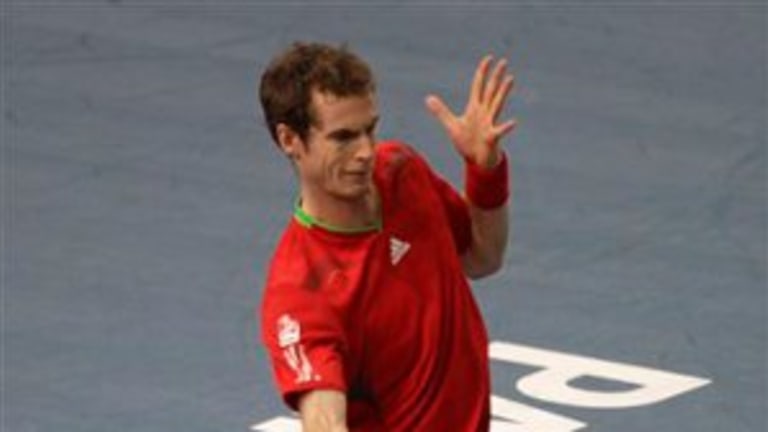There is a fate worse than death in tennis, worse even than having to return Andy Roddick's serve or running down a Rafael Nadal bolo forehand: And that is playing a guy who has a similar game to you, but is simply better than you. That was Jeremy Chardy's problem when he faced off with second-seeded Andy Murray today at the Paris Masters. Murray won it handily, 6-2, 6-4.
Murray and Chardy are both rather lean, but Murray is sinewy and muscular while Chardy looks, well, just skinny (both men are 6'2", but at 185 pounds, Murray outweighs Chardy by 20 lbs.—of mostly muscle and a little tooth). Murray looks stronger. Rangier. Fitter. Quicker.
That's it for the obvious stuff, and then you have the intangibles: Murray is craftier, and he makes far better use of the court. A ball that Murray puts 18 inches inside the baseline and two inches from the sideline, Chardy is likely to put three feet further into the court. And that makes his opponent's life easier.
But perhaps most of all, the major difference between Murray and Chardy is consistency. Both men are capable of hitting spectacular winners and even unloading massive aces. But Chardy's work in between those moments can be downright ugly. Nothing is more self-defeating than the inability to keep the ball in play long enough to either put yourself in position to win the point, or invite your opponent to make an error.
In today's match, for example, Chardy started slowly and erratically. By the time he was behind 0-3, he had won just one of the 10 points after he was forced to hit a second serve. Not all of that was due to how well Murray's shots penetrate, or how well he exploits the angles. Murray won 69 percent of his second-serve return points, while Chardy won just 11 percent against Murray's serve. And as Chardy fought to stave off a whitewash while down 0-4, Murray upped his lead in baseline points won to 17-4. It was a moral victory when Chardy finally held that fifth game, but no more than that. Murray easily served out the set.
At the start of the second set, Murray went into a mode that drives his fans and probably his support team nuts. He became passive, allowing the action to come to him as if playing defense alone could win him the match. I don't know if this sit-back-and-wait attitude represents a desire to relax, the equivalent of the bag boy at the supermarket taking his official 15-minute break from the job each morning, or the manifestation of some bizarre, unconscious desire to generate a little chaos and drama, a la vintage John McEnroe. Whatever the case, it can create some anxious moments for Murray watchers.
A consistent player can pounce on those opportunities, but Chardy wasn't able to do that. In the third game, with Chardy serving at 1-1, the Frenchman played two great points to go up 30-0. It looked for a moment like he might muster a bigger challenge than he produced in the first set. But the next points he served ended in a forehand error and a double fault. He was lucky to go on to hold, but the sequence was typical—and telling.
The match continued on serve until the fifth game, when Murray struck. A great backhand pass that forced a volley error, followed by a Chardy unforced backhand error left the Frenchman down 15-40. He double-faulted the next point, giving Murray a 3-2 lead and serve.
But the mercurial Chardy has talent; he's an entertaining guy to watch. And as the second set moved along he seemed to grow confident and focused. This guy hits the drive volley as well as anyone who ever played the game, and soon it looked as if any letdown by Murray could leave him in serious trouble, at least as far as the set went.
But Murray kept his composure and used his serve judiciously at just the right moments to stay out front. Serving the tight 10th game at 5-3, Murray crept ahead 40-30. On the next point, Chardy played a chip-and-charge point off a Murray second serve and hit a spectacular backhand cross-court volley. That he drove it just wide seemed a fitting ending.
—Pete Bodo
